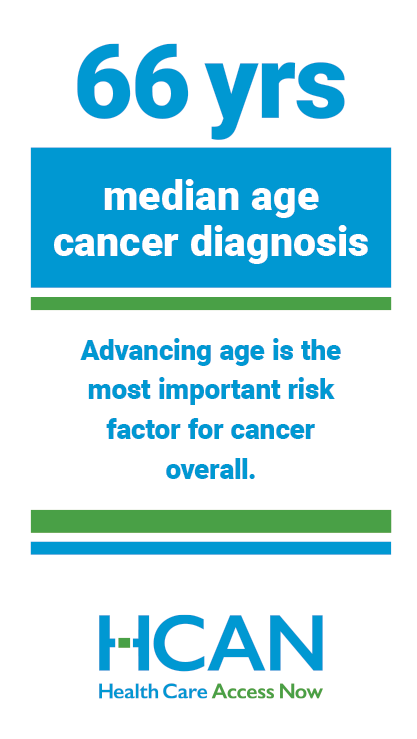Chronic Illnesses and the Elderly

Just as specific chronic illnesses (like tooth decay and asthma) are more common in the younger population, the same is true for the elderly population. “Aging increases the risk of chronic diseases like dementia, heart disease, type 2 diabetes, arthritis, and cancer,” according to the Centers for Disease Control and Prevention.
Cancer and age
The risk of developing cancer increases with age, with 66 being the median age for a cancer diagnosis. Different types of cancer have different median ages for diagnoses; for example, breast cancer’s is 62, whereas lung cancer’s is 71.
Many factors contribute to cancer risk increasing with age. For example, as we age, we’re exposed to larger numbers of carcinogens (like sunlight or cancer-causing chemicals in some foods). And our bodies change at a cellular level as we age, which can make developing cancer more likely.
Dementia and age
Dementia risk increases with age, too. People understandably can feel fearful of a potential dementia diagnosis. They worry about losing their personality, independence, and ability to enjoy life.
But, getting a dementia diagnosis early allows doctors to treat the disease more effectively. And, new drugs have been approved recently that aid in slowing the progression of Alzheimer’s disease.
Arthritis and age
As people age, the likelihood of developing osteoarthritis in joints increases. When you are diagnosed, you will work with a team of providers to develop a treatment plan that may involve elements like exercise, medication, and massage. Pain reduction strategies that you develop with your treatment team can help you improve quality of life.
How to advocate for yourself
While it is true that lifestyle choices (like smoking cigarettes or lack of exercise) can increase the risk for chronic illnesses as we age, some factors are beyond our control. If something about your health concerns you, make an appointment with your doctor. Most chronic illnesses progress more slowly when caught and treated early.
The National Institute on Aging recommends that you let your doctor know that you would like to discuss a potential chronic illness before your appointment. Share your symptoms and worries via message through your health record portal. That way, your doctor knows to plan for a longer appointment.
To ensure that your needs are addressed and you feel heard, you can use advocacy strategies, such as bringing a friend or family member along to your appointment, preparing questions and practicing what you’ll say, and being persistent.
You’re not alone
Community Health Workers (CHWs) like those trained at Health Care Access Now (HCAN) can help seniors with chronic illness in many ways. They can work with them on medication management, arranging transportation to appointments, and can even prepare them to advocate for themselves in health care situations.
Being diagnosed with a chronic illness can be devastating. Resources like CHWs can help.







